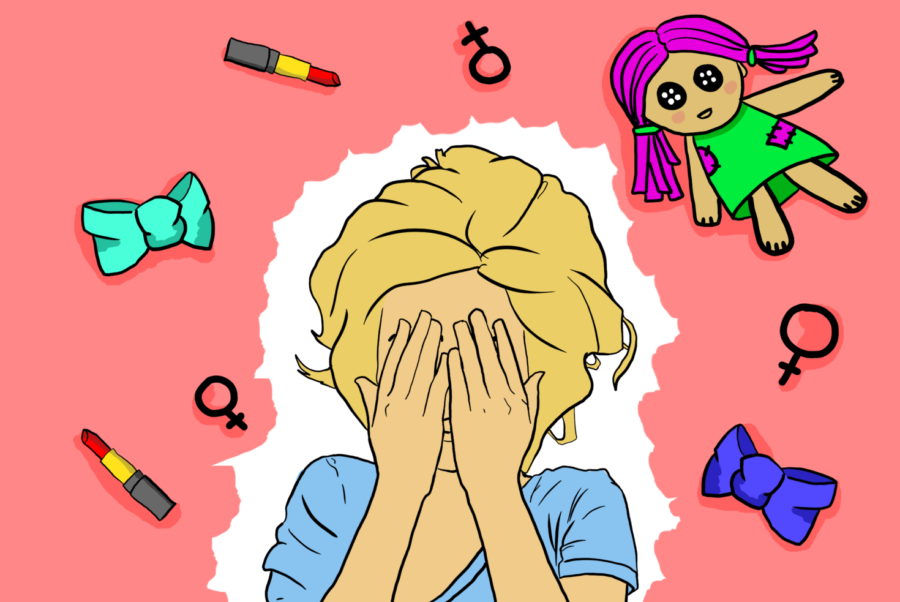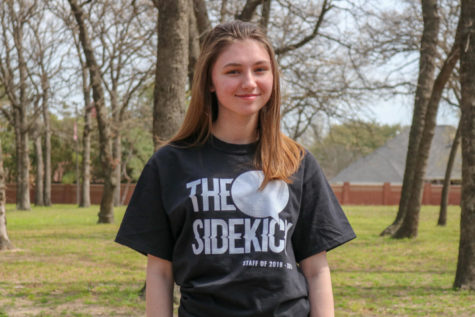My pink skirt doesn’t define me, and it shouldn’t define you
Growing up as a girl comes with many stereotypes. Claire Clements, The Sidekick editorial editor, describes her experiences with these stereotypes.
January 23, 2019
I used to hate the color pink.
It wasn’t that I hated the color itself, but the fact that growing up, pink was associated with girlinesss. And growing up, girliness was bad.
I don’t have any siblings, but I have a cousin I grew up with who is basically my brother. When he was younger, he acted a lot like most little boys his age, and he associated girls with being weak, stupid and only caring about clothes and makeup.
That, along with many people pushing this idea onto me, made being a girl seem like something I should not be associated with.
With the way society often defines being a girl, can you blame me?
When girls aren’t associated with these stereotypes, we praise it.
“I’m different than all the other girls” or “I like you because you’re different from other girls”, are all too common phrases, in both entertainment and reality. As a book nerd growing up, I saw these phrases in almost every book I read, and I saw a need to be different from other girls.
What’s so wrong with the “other girls”?
The answer is, of course, nothing.
But growing up, I didn’t know that – so I distanced myself from anything girly.
I hated dresses, pink, makeup, anything you can think of that was traditionally “girly”, but I didn’t really have real reasons for why I hated them. I even adopted an attitude that was meant to be different from the soft, demure, quiet girl: loud, confident, aggressive. I just needed to be different from the other girls because that was good.
I wasn’t the only girl doing this. Ironically, I know many girls who, in an effort to be different from other girls, chose to distance themselves from traditional femininity, even if they weren’t being true to themselves.
We became our own group – the “different” group – but in the end, we weren’t that different from each other.
But then, around eighth grade, I started to read more and more about feminism – and I started to understand that, maybe, being a girl wasn’t something bad.
I learned to own myself, girlhood and all.
Now, I like pink. And skirts. It wasn’t a change in preference, because I’d always liked them, but a change in viewpoints.
The first viewpoint that has changed for me is that being a girl is bad: It’s anything but. When a girl wears a full face of makeup everyday, that doesn’t mean she’s stupid or shallow. She just likes makeup. When a girl likes short skirts, she’s not looking for attention. She just feels good in short skirts.
The second viewpoint that has changed for me is that girlhood is defined by pink skirts. I like pink skirts, but that’s not what makes me a girl, and that doesn’t make the girl who prefers black pants over pink, floral dresses not a girl. It just means I like pink skirts, and she likes black pants, but we’re both girls who deserve just as much respect as the other.
Wear what you want. Be loud, be quiet. Do what you want. At the end of the day, you’re still a beautifully, strong girl.













Jess Hernandez • Jan 24, 2019 at 6:43 pm
Great article, Claire! Very relatable and well written. There’s nothing I love more than girls supporting one another!
Anika Arutla • Jan 24, 2019 at 1:44 pm
Claire, this is very well written and very relatable especially growing up reading books that idolize not being a ‘typical’ girl.
Molly McGill • Jan 24, 2019 at 1:02 am
I loved this story! I can totally relate and thought in order to be liked I had to be “different” instead of myself, love to see girls supporting girls!
Pramika Kadari • Jan 23, 2019 at 11:02 pm
I love this story so much and relate to it so much, Claire. I used to hate pink for literally no reason. In reality, it is quite an exquisite color.